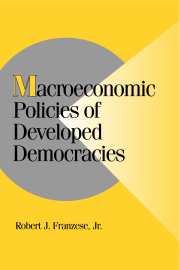Book contents
- Frontmatter
- Contents
- List of Tables and Figures
- Preface
- Acknowledgments
- 1 INTRODUCTION
- 2 THE DEMOCRATIC COMMITMENT TO SOCIAL INSURANCE
- 3 FINANCING THE COMMITMENTS: PUBLIC DEBT
- 4 MONETARY MANAGEMENT OF THE MACROECONOMY
- 5 COMPARATIVE DEMOCRATIC POLITICAL-ECONOMY AND MACROECONOMIC POLICY MAKING
- References
- Index
- Title in the series
5 - COMPARATIVE DEMOCRATIC POLITICAL-ECONOMY AND MACROECONOMIC POLICY MAKING
Published online by Cambridge University Press: 05 June 2012
- Frontmatter
- Contents
- List of Tables and Figures
- Preface
- Acknowledgments
- 1 INTRODUCTION
- 2 THE DEMOCRATIC COMMITMENT TO SOCIAL INSURANCE
- 3 FINANCING THE COMMITMENTS: PUBLIC DEBT
- 4 MONETARY MANAGEMENT OF THE MACROECONOMY
- 5 COMPARATIVE DEMOCRATIC POLITICAL-ECONOMY AND MACROECONOMIC POLICY MAKING
- References
- Index
- Title in the series
Summary
This comparative, historical study of the democratic political economy of macroeconomic policy making offered both three separate studies of the transfers, debt, and monetary policies that underlay governments' postwar commitments to political regulation of the economy and a broader set of arguments on the politics and economics of governments' evolving attempts to fulfill those commitments. This concluding chapter also follows these two paths. First, it coordinates some of the findings that emerged repeatedly in various forms throughout Chapters 2–4, commenting on their collective implications for comparative-historical study of the democratic political-economy of macroeconomic policy making. Second, after summarizing the book's results, it returns to the larger questions raised in Chapter 1 to consider very tentatively some potential implications of those results for the continued viability and utility of the democratic commitments.
Concluding Themes
Four motifs in Chapters 2–4 merit reemphasis; in order of increasing generality and brevity of their treatment here: strategic electoral and partisan policy making, the highly interactive effects of institutions and structure on such strategic actors, the varying information available across those actors for their expectations formation that undergirds such strategic actions, and the centrality of theoretically informed measurement and specification to theoretically informing empirical work.
Strategic Electoral and Partisan Policy Making
Theories of electoral and partisan effects on economic policy have long, venerable intellectual histories, perhaps representing the cornerstones of modern macro political-economy.
- Type
- Chapter
- Information
- Macroeconomic Policies of Developed Democracies , pp. 256 - 278Publisher: Cambridge University PressPrint publication year: 2002



